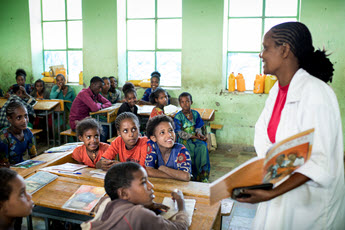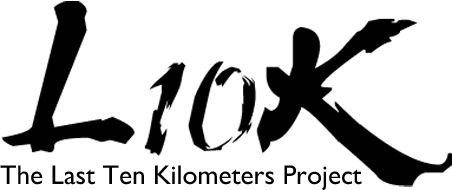Features
A Women-led Workforce Brings Health Care into Ethiopia's Households

The Health Extension Program (HEP) is the backbone of Ethiopia's primary health care system. It's workforce is made up of female health extension workers (HEWs) who work closely with a network of voluntary community women's groups called the women's development army (WDA). HEWs and the WDA criss cross their communities daily to make sure community members receive the health care services they need or are referred to higher level health facilities. Asefu Gebresalassie has worked as an HEW for eight years and recently moved to Hagare Selam Health Post in the Tigray Region of Ethiopia.
"I was trained in iCCM/CBNC [Integrated Community Case Management of Common Childhood Illness/Community Based Newborn Care] in 2012. In earlier days, child health care service was not provided at the health post level. Mothers had to travel far to get to a facility and it cost a lot of money for transportation and health service. Instead, they would visit traditional healers. All this has now been resolved with the provision of child health care services at Hagere Selam Health Post."
For over a decade, the Last Ten Kilometers (L10K) project, funded by the Bill & Melinda Gates Foundation, supported HEWs like Asefu to build their skills to provide quality reproductive, maternal, newborn, and child health care services. With additional support from the United States Agency for International Development (USAID) and UNICEF, L10K trained HEWs to correctly assess, classify, and manage common childhood illnesses and to identify and manage newborns with sepsis. By bringing treatment closer to the communities, more children now have access to lifesaving treatments.
In addition to providing health care services at health posts and during household visits, HEWS visit schools to provide lessons on good nutrition practices and information on health services for students to bring home to their families.
"At first, the community was not aware that child health care services were available at the health post. So we started to raise awareness through churches and schools and we invited families over to the health post to come and see for themselves."
"In time we saw a decrease in the number of diarrhea and pneumonia cases, which were quite common in children. If a child had skin problems, the parents did not know that it could be medically treated so they would always go to religious healers. Using iCCM/CBNC approaches, we are able to treat most childhood illnesses and parents are happy to see their children healed."
"We are also happy to see our community satisfied because as mothers ourselves, we know the pain of having a sick child and being unable to help the child."
"We provide services at the health post and in homes during our house-to-house visits. Since we travel with our kit [of tools, handbooks, and materials], when we find sick children, we can easily diagnose and treat them. Mothers trust us greatly and tell us that next to the Creator they trust that we shall heal their children. This is a huge responsibility."
"Over the years, we have been able to identify sick children and treat them and as a result, infant and child mortality [especially under five] has significantly decreased."
The L10K 2020 project, the second phase of the project, continues to support Ethiopia's health system by building the capacity of the staff and systems of the Regional Health Bureaus and Zonal Health Departments to ensure health care providers like Asefu have the support, skills, and tools they need to provide quality and equitable RMNCH services.
